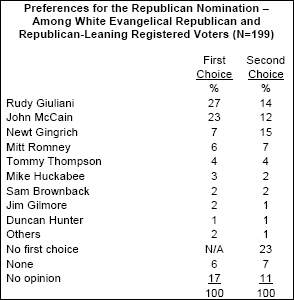April 2, 2007
by John Green, Senior Fellow, Pew Forum on Religion & Public Life
One of the largest religious groups in the U.S., representing about one-fifth of the electorate, white evangelicals are a strong Republican constituency. According to the 2004 exit polls, 78% of this group voted for George W. Bush while 21% supported John F. Kerry. In 2006, the exit polls showed that 72% of this group voted for Republican congressional candidates and 27% for Democratic congressional candidates.
What are the candidate preferences of white evangelical Republicans at this early stage of the 2008 presidential campaign? The Forum’s analysis of the findings from a recent survey from the Pew Research Center for the People & the Press provides an interesting early reading.
Among evangelical Republican and Republican-leaning registered voters, Rudolph Giuliani and John McCain garner roughly equivalent levels of support (27% say Giuliani is their most preferred candidate and 23% support McCain). Additionally, Giuliani and McCain are each the second choice candidate of about one-in-eight evangelicals. Nearly a quarter of Republican evangelicals (23%) do not have a first-choice candidate at this point.
All the other Republican candidates, including Newt Gingrich and Mitt Romney, receive significantly less support from white evangelicals. Several candidates with strong ties to the evangelical community, including Mike Huckabee and Sam Brownback, have very modest support among evangelicals at this stage of the campaign.

See a comparison of white evangelical Republicans and other Republicans in the survey
Religion & Politics ’08, a new feature of the Pew Forum on Religion & Public Life, has also present findings on white non-Hispanic Catholics (Democratic and Republican) and white mainline Protestants (Democratic and Republican). The survey did not include enough evangelical Democrats, seculars or members of other religious groups to permit statistically valid analysis of their views.
The Survey
Results are based on telephone interviews conducted under the direction of Princeton Survey Research Associates International among a nationwide sample of 1,503 adults, 18 years of age or older, from March 21-25, 2007. (More details on the survey, including a discussion of candidate preferences among the public as a whole as well as additional methodological details and exact question wording.)
Respondents were asked to pick their first and second choices for the presidential nominations from separate lists of eight Democrats (Hillary Clinton, Barack Obama, Al Gore, John Edwards, Joe Biden, Chris Dodd, Dennis Kucinich and Bill Richardson) and nine Republicans (Rudy Giuliani, John McCain, Newt Gingrich, Mitt Romney, Sam Brownback, Jim Gilmore, Mike Huckabee, Duncan Hunter and Tommy Thompson).



